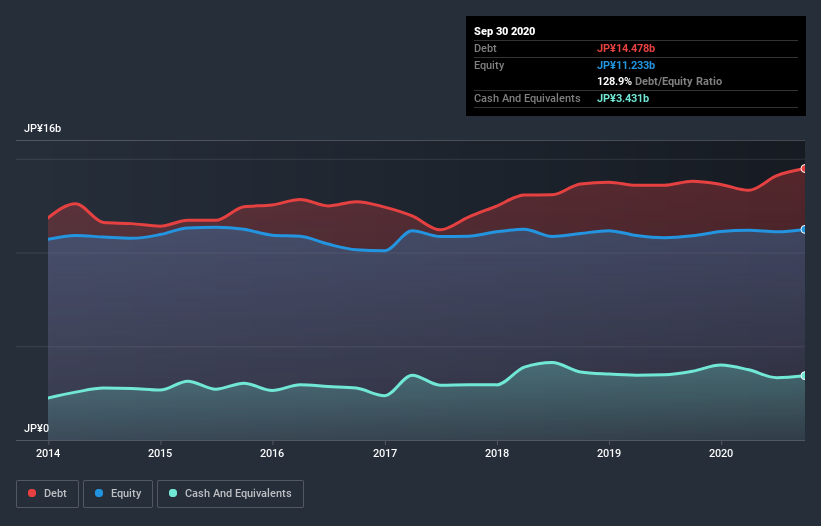- Japan
- /
- Transportation
- /
- TSE:9060
Japan Logistic Systems (TYO:9060) Takes On Some Risk With Its Use Of Debt

David Iben put it well when he said, 'Volatility is not a risk we care about. What we care about is avoiding the permanent loss of capital.' It's only natural to consider a company's balance sheet when you examine how risky it is, since debt is often involved when a business collapses. We note that Japan Logistic Systems Corp. (TYO:9060) does have debt on its balance sheet. But should shareholders be worried about its use of debt?
What Risk Does Debt Bring?
Debt is a tool to help businesses grow, but if a business is incapable of paying off its lenders, then it exists at their mercy. If things get really bad, the lenders can take control of the business. However, a more frequent (but still costly) occurrence is where a company must issue shares at bargain-basement prices, permanently diluting shareholders, just to shore up its balance sheet. Having said that, the most common situation is where a company manages its debt reasonably well - and to its own advantage. When we think about a company's use of debt, we first look at cash and debt together.
Check out our latest analysis for Japan Logistic Systems
How Much Debt Does Japan Logistic Systems Carry?
The chart below, which you can click on for greater detail, shows that Japan Logistic Systems had JP¥13.6b in debt in September 2020; about the same as the year before. However, because it has a cash reserve of JP¥3.43b, its net debt is less, at about JP¥10.2b.

How Healthy Is Japan Logistic Systems's Balance Sheet?
We can see from the most recent balance sheet that Japan Logistic Systems had liabilities of JP¥13.2b falling due within a year, and liabilities of JP¥14.5b due beyond that. Offsetting these obligations, it had cash of JP¥3.43b as well as receivables valued at JP¥6.81b due within 12 months. So it has liabilities totalling JP¥17.4b more than its cash and near-term receivables, combined.
The deficiency here weighs heavily on the JP¥5.06b company itself, as if a child were struggling under the weight of an enormous back-pack full of books, his sports gear, and a trumpet. So we definitely think shareholders need to watch this one closely. At the end of the day, Japan Logistic Systems would probably need a major re-capitalization if its creditors were to demand repayment.
We use two main ratios to inform us about debt levels relative to earnings. The first is net debt divided by earnings before interest, tax, depreciation, and amortization (EBITDA), while the second is how many times its earnings before interest and tax (EBIT) covers its interest expense (or its interest cover, for short). Thus we consider debt relative to earnings both with and without depreciation and amortization expenses.
Japan Logistic Systems has net debt to EBITDA of 3.8 suggesting it uses a fair bit of leverage to boost returns. On the plus side, its EBIT was 8.8 times its interest expense, and its net debt to EBITDA, was quite high, at 3.8. Notably Japan Logistic Systems's EBIT was pretty flat over the last year. Ideally it can diminish its debt load by kick-starting earnings growth. There's no doubt that we learn most about debt from the balance sheet. But it is Japan Logistic Systems's earnings that will influence how the balance sheet holds up in the future. So if you're keen to discover more about its earnings, it might be worth checking out this graph of its long term earnings trend.
Finally, a company can only pay off debt with cold hard cash, not accounting profits. So we clearly need to look at whether that EBIT is leading to corresponding free cash flow. Looking at the most recent three years, Japan Logistic Systems recorded free cash flow of 35% of its EBIT, which is weaker than we'd expect. That's not great, when it comes to paying down debt.
Our View
Mulling over Japan Logistic Systems's attempt at staying on top of its total liabilities, we're certainly not enthusiastic. But at least it's pretty decent at covering its interest expense with its EBIT; that's encouraging. We're quite clear that we consider Japan Logistic Systems to be really rather risky, as a result of its balance sheet health. For this reason we're pretty cautious about the stock, and we think shareholders should keep a close eye on its liquidity. When analysing debt levels, the balance sheet is the obvious place to start. But ultimately, every company can contain risks that exist outside of the balance sheet. Case in point: We've spotted 2 warning signs for Japan Logistic Systems you should be aware of, and 1 of them is a bit unpleasant.
When all is said and done, sometimes its easier to focus on companies that don't even need debt. Readers can access a list of growth stocks with zero net debt 100% free, right now.
If you decide to trade Japan Logistic Systems, use the lowest-cost* platform that is rated #1 Overall by Barron’s, Interactive Brokers. Trade stocks, options, futures, forex, bonds and funds on 135 markets, all from a single integrated account. Promoted
New: Manage All Your Stock Portfolios in One Place
We've created the ultimate portfolio companion for stock investors, and it's free.
• Connect an unlimited number of Portfolios and see your total in one currency
• Be alerted to new Warning Signs or Risks via email or mobile
• Track the Fair Value of your stocks
This article by Simply Wall St is general in nature. It does not constitute a recommendation to buy or sell any stock, and does not take account of your objectives, or your financial situation. We aim to bring you long-term focused analysis driven by fundamental data. Note that our analysis may not factor in the latest price-sensitive company announcements or qualitative material. Simply Wall St has no position in any stocks mentioned.
*Interactive Brokers Rated Lowest Cost Broker by StockBrokers.com Annual Online Review 2020
Have feedback on this article? Concerned about the content? Get in touch with us directly. Alternatively, email editorial-team@simplywallst.com.
About TSE:9060
Japan Logistic Systems
Operates in cargo vehicle transport, freight forwarding, warehousing, packing and wrapping, and logistics system consulting businesses in Japan and internationally.
Slight with mediocre balance sheet.
Market Insights
Community Narratives




